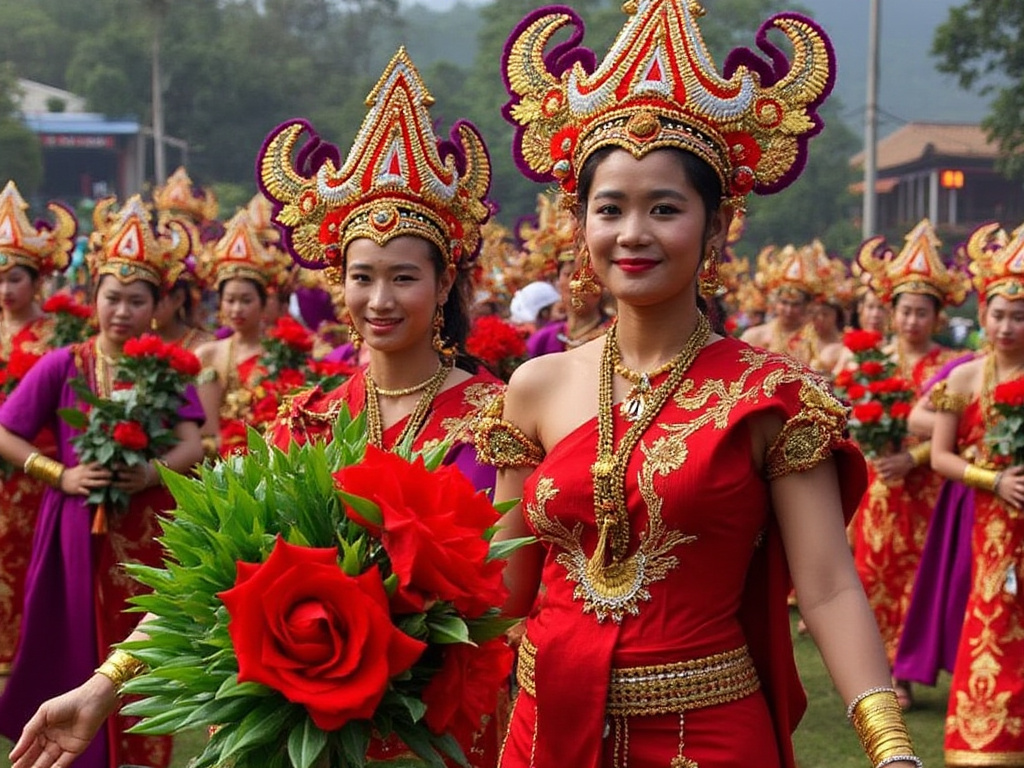If you think New Year’s festivities are reserved for January, think again! In Laos, the New Year, known as Pi Mai, is celebrated in mid-April, marking the end of the dry season and welcoming the rains with vibrant festivities and meaningful rituals. For TESOL teachers looking to immerse themselves in the rich culture of Laos, Pi Mai is a perfect opportunity to experience an ancient celebration that’s filled with joy, tradition, and a sense of renewal.
A Unique New Year’s Celebration
Pi Mai is the largest festival in Laos, especially celebrated in Luang Prabang, where the entire city comes alive with music, dance, and ceremonies. Businesses close for the week, and the streets are filled with locals and visitors who partake in various activities to celebrate. One of the festival’s most beloved traditions is the cleansing of Buddha statues in temples with scented water. This symbolic act represents washing away the misfortunes of the past year and preparing for a fresh start.
Fun Fact: In addition to Buddha statues, people also cleanse their homes and throw water on each other to wash away bad luck. This tradition has grown into an all-out water fight, making Pi Mai a refreshing celebration during one of the hottest months of the year in Laos!
Traditional Costumes, Music, and the Grand Parade
Pi Mai’s grand parade, held in Luang Prabang, is a spectacle not to be missed. Participants wear traditional Lao attire, and musicians play lively, authentic Lao tunes as they dance through the streets. The highlight of the parade is the procession of the sacred Prabang Buddha statue, from which Luang Prabang gets its name. People gather to pay their respects and offer prayers for good fortune in the coming year.
Fun Fact: The Prabang Buddha statue is believed to be one of the most sacred in Laos, and its appearance in the parade is a rare and deeply revered moment. It symbolizes peace, happiness, and prosperity for the Laotian people.
Boat Races and Sporting Events
Boat races on the Mekong River add a competitive edge to the festival, where teams row with intense determination and skill. Other popular sporting events, like pétanque (a game similar to bocce), take place during Pi Mai, with locals and visitors joining in to cheer for their favorite teams.
How TESOL Certification Opens Doors to Cultural Experiences
For TESOL teachers, experiencing Pi Mai in person is an opportunity to deepen your understanding of Lao culture while living and working in the country. American TESOL Institute offers certification programs that equip teachers to work abroad responsibly and sustainably. Teaching English in Laos provides the chance to be part of community celebrations like Pi Mai, bringing language learning and cultural exchange into your classroom in meaningful ways.
Fun Fact: Pi Mai shares similar traditions with Songkran, celebrated in Thailand and Myanmar. However, each country adds its unique touches to the festivities, making each experience one-of-a-kind!
Celebrate in Laos: Start Your TESOL Journey
If you’re interested in teaching abroad and joining in on this unforgettable celebration, obtaining a TESOL certification can be the first step. Working as an English teacher in Laos allows you to embrace the local culture, engage with welcoming communities, and celebrate traditions like Pi Mai alongside your students. So, if you’re ready for an adventure and to start the New Year in April, Laos awaits with open arms!
Lao New Year, or Pi Mai, is celebrated in April. This is the biggest celebration in Laos, especially in Luang Prabang, where most businesses close for the week. Buddhas from temples are cleaned with scented water, and people throw water on one another in the streets to symbolize cleansing and purification. Other events include boat races, and a grand parade with traditional Lao costumes, music and dance, as well as the procession of the sacred Prabang Buddha. Learn more about celebrating the Laos New Year.
American TESOL offers a certification to teach English abroad so individuals can attend these exciting events in a sustainable and responsible way. Learn more about living and working in Laos.



